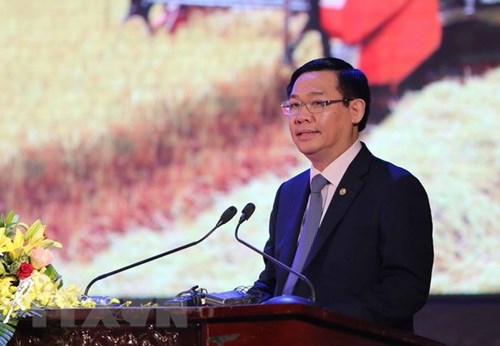He made the affirmation in a recent article on the plan on the salary policy reform for officials, public employees, civil servants, members of armed forces and employees in enterprises. This plan is one of the three important plans being discussed at the seventh plenary session of the 12th-tenure Party Central Committee, which opened in Hanoi on May 7.
    |
 |
|
Deputy Prime Minister Vuong Dinh Hue |
Deputy PM Hue, who is also a Politburo member and chairman of the central steering committee for reforming the salary policy, social insurance and special treatment for national contributors, noted that the salary policy directly relates to macro-economic balances, the labour market and the lives of salary earners. Its reform will help build a streamlined, clean and efficient political system and strengthen the fight against corruption.
Regarding the targets and road map for the implementation of the salary policy reform, he said in the public sector, the basic wage has been adjusted upwards from 2018 to 2020 in line with the National Assembly’s resolutions so that it is not lower than the consumer price index (CPI) and in conformity with the country’s economic growth rate.
From 2021 to 2025 and with a vision to 2030, a new salary regime will be applied for officials, public employees, civil servants and members of armed forces in the whole political system from 2021.
The country targets that in 2021, the lowest wage of officials, public employees and civil servants will be equivalent to the average lowest pay level in the business sector. By 2030, it is expected to be equivalent to or higher than the lowest salary level in the region with the highest pay of the business sector.
Meanwhile, from 2018 to 2020, the region-based minimum wage in the enterprise sector is set to be raised in accordance with the socio-economic development situation, businesses’ payment capacity, and workers’ living standards so that the minimum wage will be able to meet basic needs of workers and their families, Deputy PM Hue noted.
From 2021 to 2025 and with a vision of 2030, the State will increase the region-based minimum wage periodically basing on recommendations of the National Wage Council. It will not directly intervene in businesses’ wage policy from 2021.
By 2025, it will manage employees and salary in State-owned enterprises by assigning fixed salary costs associated with production and business tasks to enterprises. It will gradually move towards only assigning production and business tasks to companies from 2030.
In his article, Deputy PM Hue also clarified seven tasks and solutions to reform the salary policy, especially drastically carrying out financial and budgetary solutions to create resources for the salary policy reform and effectively implementing the resolutions on continued re-organising the political system and reforming the system and operation efficiency of public non-productive units, which were issued at the sixth plenary session of the 12th-tenure Party Central Committee.
The Deputy PM added that Vietnam’s salary policy has been reformed four times, in 1960, 1985, 1993 and 2003.
In the public sector, the wage has been improved step by step, helping to improve living standards of salary earners. The basic salary has been raised 11 times since 2003, from 210,000 VND to 1.3 million VND per month, surging by 519 percent, which is higher than the CPI growth of 208.58 percent in the same period.
Source: VNA